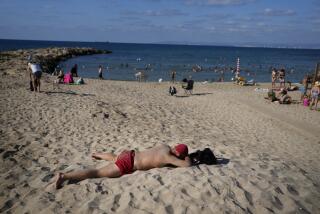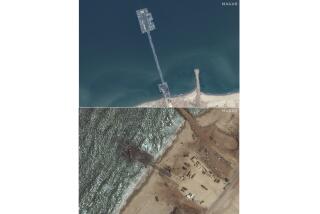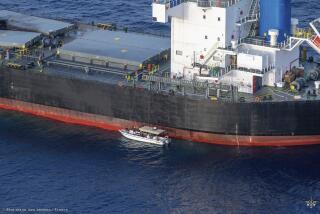Suddenly the Crisis Focus Shifts to Hot, Sleepy Aqaba : Blockade: The refusal to implement a U.N. ban on trade with Iraq puts Jordan in conflict with the U.S.
- Share via
AQABA, Jordan — The half-dozen employees of the Iraqi-Jordanian Land Transport Co., a private freight forwarder, sat Tuesday beneath a poster depicting the crossed flags of Iraq and Jordan as they emphatically fingered their worry beads.
For more than a week, they said, no ship with cargo for Iraq has docked at the Red Sea port, and the workers wondered when, or if, any would.
“This is not usual,” said Isa Habaiba, a wiry worker. “We do not know what to think.”
The hot, sleepy port of Aqaba, Jordan’s only window on the sea, is suddenly a center of international tension. The government of Jordan has refused to implement a U.N. ban on trade with Jordan’s next-door neighbor, Iraq, which the Security Council imposed after Iraq’s invasion of the tiny oil state of Kuwait on Aug. 2.
The refusal to close off Aqaba to Iraqi trade puts Jordan in conflict with the United States. Jordan’s leader, King Hussein, is visiting Washington today in hopes of playing an arbiter’s role in the conflict between the United States and Iraq.
Bush Administration officials have expressed disappointment that Jordan has not applied the U.N. sanctions. By putting warships in the Red Sea, the Administration has indicated that it may take the issue out of King Hussein’s hands and blockade Aqaba, located on a gulf that is an arm of the Red Sea.
Washington has announced that American ships will enforce the embargo in both the Red Sea and the Persian Gulf, even though the United Nations stopped short of ordering a blockade.
This makes for a nervous Jordanian port. “I think our business will shrink,” said Habaiba, who told visitors that his company deals only in general cargo and not arms.
Awad Tell, the port director at Aqaba, told reporters that he has received no orders from Amman, Jordan’s capital, to stop Iraqi use of the port. Freight shippers said that earlier in the week the Norwegian freighter Tanga unloaded a cargo of wheat bound for Iraq.
“Everything here is normal,” said Tell. “We have received no special instructions.”
Asked whether Iraqi cargo had arrived or is expected, he answered with a brusque, “No comment.”
In recent days, Jordan has emerged as one of Iraq’s most vocal allies. King Hussein attacked the sending of American troops to defend Saudi Arabia as a step toward colonizing the Arab world. Government officials have evaded the question of whether Jordan will help implement U.N. sanctions against Iraq.
On Tuesday, the monarch’s brother, Prince Hassan, said that if Jordan is forced to limit shipping at Aqaba, the country would expect to receive money in return. “When the position of the navies moves from imposing sanctions to a blockade and that threatens everyone in the region . . . I think those affected are due compensation,” he said.
Despite King Hussein’s reluctance to act, cargo arriving at Aqaba for overland shipment to Iraq seems to have slowed. Abdul Khader Amro, a freight forwarder, said that at least five ships with Iraq-bound cargoes, seeking to sail from the Mediterranean into the Red Sea, are being delayed at the Suez Canal by Egypt, which backs the embargo against Iraq. The cargoes, Amro said, include oil equipment and wheat.
“My silos are empty,” he said. “Egypt is taking orders from America.”
Aqaba sits at the head of the Gulf of Aqaba and shares a crescent-moon bay with the Israeli city of Eilat to the west. The towns, which are in sight of each other, are not on speaking terms: Jordan does not recognize Israel.
The closeness to Israel is another cause for worry among workers at the port. David Levy, Israel’s foreign minister, has accused Jordan of permitting Aqaba to help Iraq evade the embargo. Jordanians took this as a warning that Israel itself might block the port.
Perhaps the last time that Aqaba was in the world’s headlines was when T. E. Lawrence, the fabled Lawrence of Arabia, organized an attack by Arab rebels on a Turkish garrison at the port during World War I. The charge by a camel brigade from the desert galvanized the Arab revolt that Britain subsequently encouraged to tie down troops of the Ottoman Empire, which was allied with Germany.
On Tuesday, Aqaba baked in 95-degree heat, but port workers said they considered it a cool day. Seven ships sat on the mirror-flat waters of the port. Three had arrived during the day. One was from Sudan and carried cotton, another from France carried sugar, and a third from Yugoslavia was filled with general cargo.
Reporters were not permitted to visit the port, and police inspected the notes of several journalists who held interviews at businesses just outside the main gate.
The Jordanians were not the only ones on the Red Sea shore to express tension Tuesday. Not far away, the Israelis were feeling some of it too.
“I hope nothing happens here,” said Hila Meroz, gazing from Eilat across the Jordanian frontier at the ships in Aqaba harbor Tuesday afternoon. “I hope there won’t be any war.”
The blonde, swimsuit-clad schoolteacher had just emerged from the salty waters of the gulf. A few hundred yards out in the water, an Israeli gunboat swung at its mooring buoy, almost bow-to-bow with a smaller Jordanian patrol boat on the seaward side.
“That’s the first time we’ve seen that Jordanian boat pull away from its dock,” said an Israeli soldier, sitting in a jeep assigned to guard the border.
The land border between these twin cities is marked by an Israeli bunker flying the Star of David and mounting an array of electronic monitoring devices.
The seaside frontier is designated by several red and white buoys, with signs in Hebrew warning sailors that they are about to enter Jordanian waters.
Behind both cities rise harsh, rust-colored mountains, without a shred of foliage, baking in the heat.
In addition to being a favorite resort of Israelis in the summer and northern Europeans in the winter, Eilat is also an important Israeli port. On Tuesday, a ship was unloading cars from Japan.
But attention here is focused on the ships in Aqaba, at anchor and docked. Israeli intelligence agents have been keeping a sharp eye on seaborne traffic into Aqaba, which is King Hussein’s favorite Jordanian resort, a place where he often water skis with guests.
Williams reported from Aqaba and Tuohy from Eilat.
More to Read
Sign up for Essential California
The most important California stories and recommendations in your inbox every morning.
You may occasionally receive promotional content from the Los Angeles Times.










